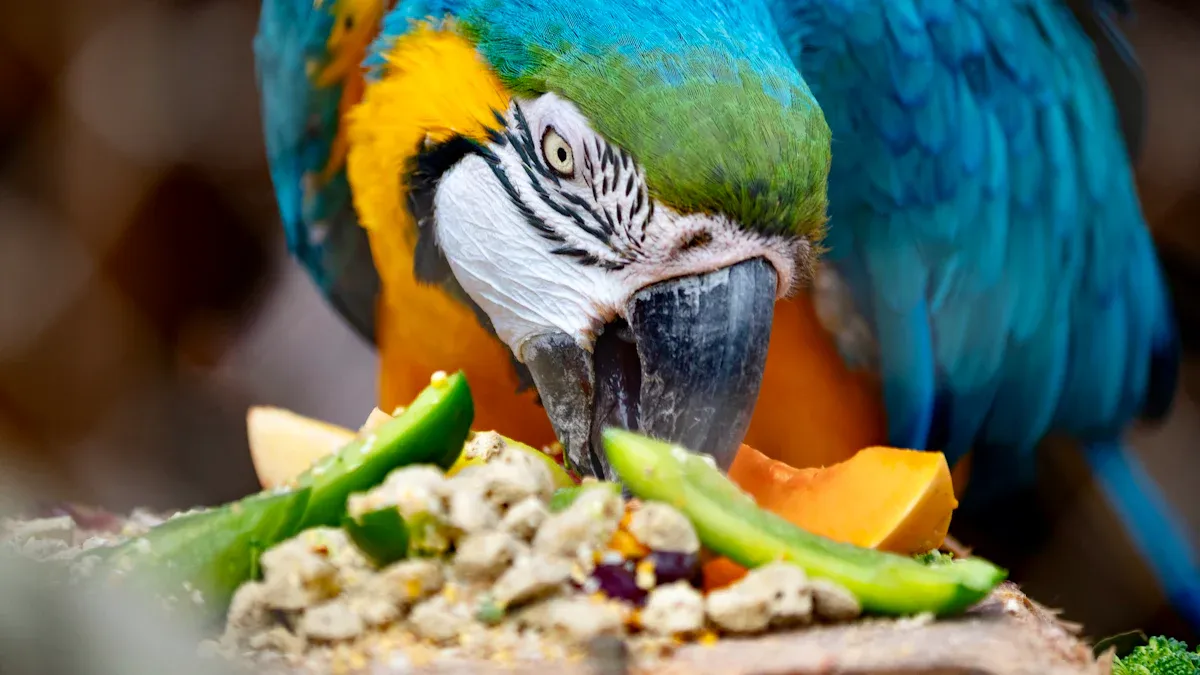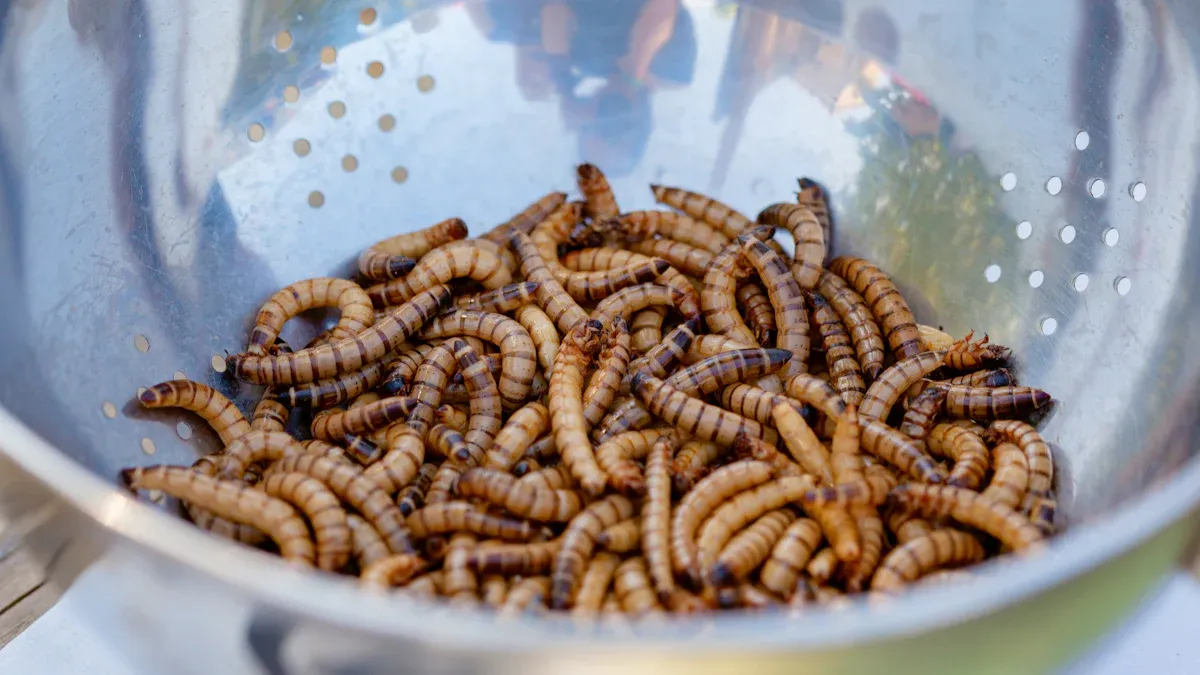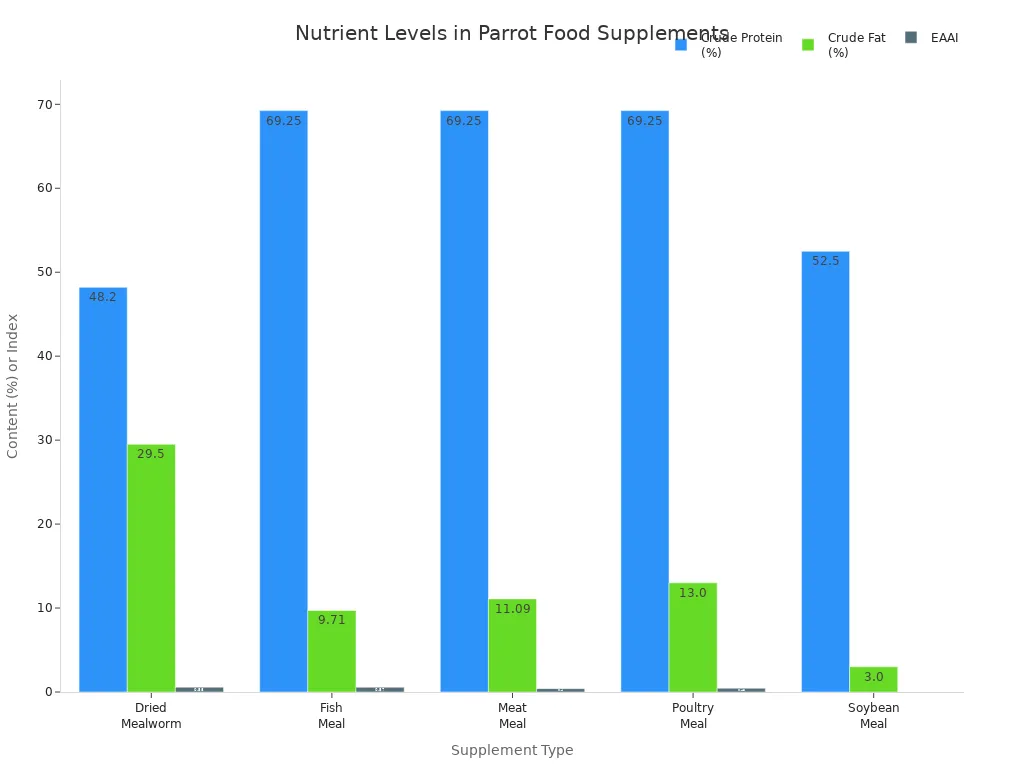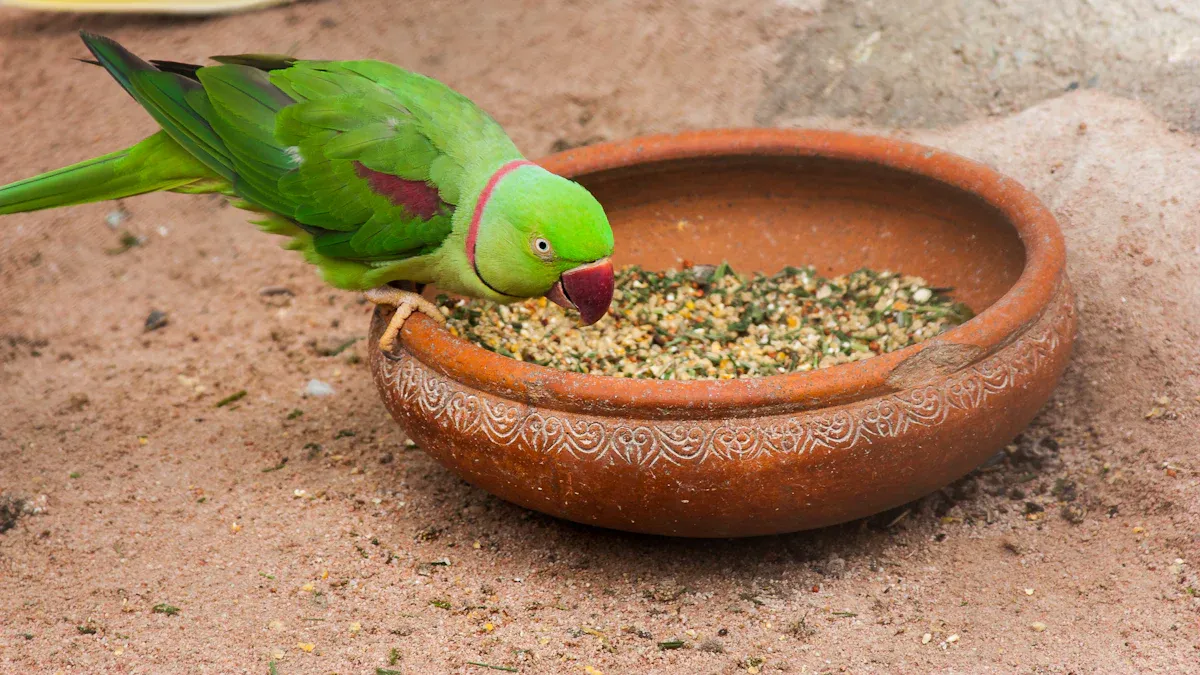
Mealworms Parrot’s Meals can safely include dried mealworms as a nutritious treat. Experts confirm that healthy parrots digest mealworms well, using their unique digestive systems. Mealworms provide protein, essential amino acids, and minerals, supporting growth and energy. Choosing mealworms also helps reduce environmental impact compared to traditional animal proteins.
Key Takeaways
- Dried mealworms offer parrots high-quality protein and healthy fats that support muscle growth, feather health, and energy.
- Always choose certified, high-quality mealworms and introduce them slowly while watching your parrot’s health and behavior.
- Feed mealworms as a treat in small amounts, mix them properly with other foods, and avoid overfeeding to keep your parrot safe and happy.
Mealworms Parrot’s Meals: Safety, Benefits, and Suitable Species

Are Dried Mealworms Safe for Parrots?
Parrot owners often ask if dried mealworms are safe for their birds. Most healthy parrots can enjoy dried mealworms as a treat, but safety depends on several factors. Avian veterinarians recommend using only mealworms raised for pet food. This reduces the risk of harmful bacteria or parasites. Some risks exist, especially if mealworms are not sourced properly or are fed in large amounts.
Note: Feeding too many dried mealworms can cause health problems. Some parrots may struggle to digest the hard shell, which can lead to bowel issues. High protein levels may also affect certain species, such as Eclectus parrots, and overfeeding can cause obesity or fatty liver disease.
Here are some common health risks to consider:
- Parasites or bacteria in poorly sourced mealworms
- Digestive problems from the hard chitin shell
- High protein causing neurological or health issues in sensitive species
- Fatty liver disease from excessive fat intake
- Dehydration or digestive issues from freeze-dried mealworms lacking moisture
Avian experts suggest using dried mealworms as a supplement, not a staple. For young or weaning birds, powdered freeze-dried mealworms can be part of a balanced formula. Caregivers should monitor intake and adjust as needed.
Nutritional Benefits of Mealworms for Parrots
Mealworms Parrot’s Meals offer many nutritional advantages. Dried mealworms contain high-quality protein, healthy fats, and important vitamins and minerals. These nutrients support muscle growth, feather health, and energy. The protein in mealworms is easy to digest and helps with tissue repair. Healthy fats provide energy, especially during molting, breeding, or periods of high activity.
The table below compares the nutrition in dried mealworms to other common parrot food supplements:
| Nutrient / Parameter | Dried Mealworm Larvae | Fish Meal | Meat Meal | Poultry Meal | Soybean Meal |
|---|---|---|---|---|---|
| Crude Protein (CP) | 46% to 52% | 65.5% to 73% | 65.5% to 73% | 65.5% to 73% | 49% to 56% |
| Crude Fat | 25% to 35% | 9.71% | 11.09% | 13.00% | 3% |
| Calcium (Ca) | Low (0.04%) | Higher | Higher | Higher | Not specified |
| EAAI (Amino Acid Index) | 0.58 | 0.57 | 0.40 | 0.45 | Not specified |
| Protein Digestibility | Higher | Lower | Lower | Lower | Not specified |

Mealworms also provide vitamins B2 and B12, iron, magnesium, and zinc. These nutrients help with metabolism, immune function, and bone strength. However, dried mealworms are low in calcium, so they should not replace a balanced diet.
Tip: Mixing dried mealworms with a vitamin and mineral supplement, such as Prime, can help balance the diet and boost nutrition.
Mealworms Parrot’s Meals encourage natural foraging behavior. Parrots enjoy searching for mealworms in their food, which keeps them active and mentally engaged.
Which Parrot Species Can Eat Dried Mealworms?
Not all parrots benefit equally from dried mealworms. Some species enjoy them more than others. Small parrots, such as budgerigars, cockatiels, and lovebirds, may eat mealworms as a treat. Larger parrots, like African greys and Amazons, can also enjoy them in moderation. Finches and softbills often relish insects and mealworms as part of their natural diet.
Note: Eclectus parrots and some other species may have trouble with high protein or fat levels. Owners should consult an avian veterinarian before adding mealworms to their diet.
Mealworms Parrot’s Meals can be a nutritious supplement for many birds. Always introduce new foods slowly and watch for any changes in health or behavior.
How to Prepare and Mix Dried Mealworms into Parrot Food

Choosing Quality Dried Mealworms
Selecting high-quality dried mealworms is important for your parrot’s health. Not all mealworms meet the same standards. Look for products that are certified for avian diets. Veterinary certification ensures the mealworms are safe and pure. The freeze-drying process helps keep nutrients and extends shelf life. Some brands, like Tradeking, offer veterinary-certified mealworms. These products go through strict safety checks.
Here is a table showing an example of a certified product:
| Product Name | Certification | Significance |
|---|---|---|
| RM Top Rated 100g Dried Mealworm | ISO22000 | Ensures compliance with international food safety standards, guaranteeing product quality and safety for avian diets. |
Mealworms Parrot’s Meals recommends using only mealworms from trusted sources. Avoid wild-caught mealworms because they may carry germs or diseases.
Storing and Preparing Mealworms
Proper storage keeps dried mealworms fresh and safe for parrots. Follow these best practices:
- Store mealworms in airtight containers to keep out moisture and air.
- Place containers in a cool, dry, and dark area to prevent mold and spoilage.
- Do not refrigerate dried mealworms, as condensation can cause mold. Freezing is fine if the container is sealed tightly.
- Check mealworms often for signs of spoilage, such as bad smells, mold, or pests.
Good storage can keep mealworms fresh for up to a year. Always use proper drying techniques to preserve nutrition.
Before feeding, select only healthy mealworms. Remove any that look damaged or discolored. Some people moisten dried mealworms before feeding to make them more appealing. If you do this, only leave them out for a short time to avoid spoilage.
Mixing Mealworms into Parrot Meals
Mealworms Parrot’s Meals can be added to many types of parrot food. Freeze-dried mealworms work well in homemade dry mixes. These mixes often include dried fruits, seeds, and grains. Store the mix in an airtight container to keep it fresh.
Some parrots prefer mealworms that are slightly moist. Soak dried mealworms in water for a few minutes before mixing them with seeds or pellets. This makes the mealworms softer and easier to eat. Parrots may ignore dry mealworms if mixed directly with seeds, but they often enjoy soaked ones.
Mealworms can also be added to homemade suet cakes or patties. These treats provide extra protein and attract a variety of birds. Always use recipes that are safe for parrots.
Tip: Mixing mealworms with a vitamin and mineral supplement, such as Prime, can help balance your parrot’s diet.
Portion Sizes and Feeding Frequency
Feed dried mealworms as a treat, not as a main food. Most parrots do well with a small amount, such as a teaspoon, two or three times a week. Adjust the portion based on your parrot’s size and activity level. Large parrots may eat a bit more, while small parrots need less.
Mealworms Parrot’s Meals should not replace fresh fruits, vegetables, or pellets. Use mealworms to add variety and nutrition. Overfeeding can cause health problems, so always measure portions carefully.
Monitoring Your Parrot’s Response
Watch your parrot closely when you introduce dried mealworms. Look for signs of enjoyment, such as active foraging or quick eating. Also, check for any negative reactions, like changes in droppings, loss of appetite, or unusual behavior.
If your parrot shows any problems, stop feeding mealworms and talk to an avian veterinarian. Every bird is different. Some may love mealworms, while others may not show interest. Always introduce new foods slowly and observe your bird’s health.
Mealworms Parrot’s Meals can enrich your parrot’s diet and encourage natural foraging. By choosing quality mealworms, storing them properly, and mixing them into meals the right way, you help keep your parrot healthy and happy.
- Mealworms Parrot’s Meals provide protein and fat that support muscle and feather health.
- Parrots benefit from foraging and variety in their diet.
- Owners should introduce mealworms slowly and watch for changes in health.
The Association of Avian Veterinarians recommends consulting an avian vet before making dietary changes.
FAQ
Can all parrots eat dried mealworms?
Most parrots can enjoy dried mealworms as a treat. Some species, like Eclectus parrots, need less protein. Owners should always check with an avian vet.
How should owners introduce dried mealworms to a parrot’s diet?
Start with a small amount. Watch the parrot’s behavior and droppings. Increase slowly if the bird shows no problems. Mealworms Parrot’s Meals recommends gradual introduction.
Can dried mealworms be mixed with supplements?
Yes! Mixing dried mealworms with a vitamin and mineral supplement, such as Prime, helps balance nutrition and supports overall health.


